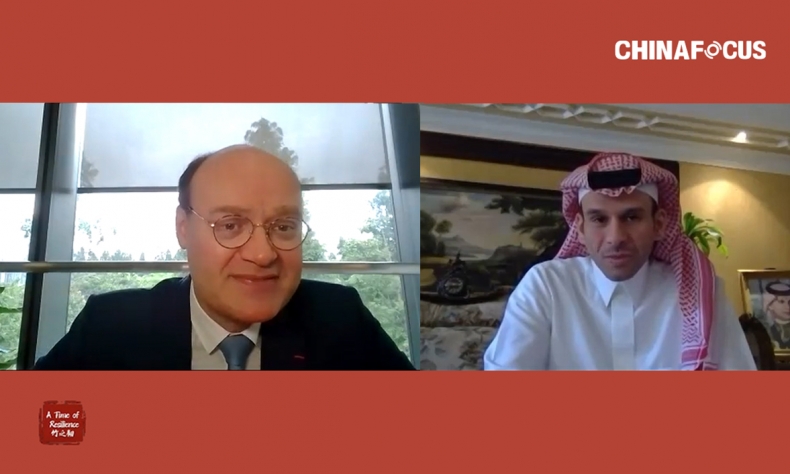Abdulaziz Alfakhri: Saudi Arabia and China in a Multipolar World

We get to understand each other and cultures, which will help bring prosperities not just for the two nations or any other bilateral relationship, but those around this world.
Editor’s Note: China and Saudi Arabia have a long friendship and solid cooperation. Amid of the Covid-19 impact, the world needs to enhance multilateral cooperation on containing the pandemic. What should China and Saudi Arabia do to tackle the challenge? David Gosset, the founder of Europe-China Forum, discussed with Abdulaziz M. Alfakhri, Senior Executive of SABIC, Saudi Arabia. Mr. Alfakhri worked and lived in China for years and he has a good understanding of the nation.
A Time of Resilience, hosted by Mr. Gosset, is a high-level dialogue with international veteran diplomats, business elites and outstanding scholars. The serial interviews are presented by China Focus in association with DG2CI Limited.
David Gosset: Abdulaziz, welcome to this conversation in the time of resilience. It’s really a great pleasure. You are in Saudi Arabia. I am in China. Clearly, this is the 21st century, we meet in the cyber space. I would like to ask you, Abdulaziz, because you are a very experienced business leader, what “resilience” means for you?
Abdulaziz Alfakhri: Thank you David for having me on your show. I think this is fantastic and it’s my greatest pleasure to be with you. “Resilience” is a fantastic word in today’s environment. A lot of us, we have seen it through different aspects in the way, and I think it’s simple that you get challenged, and a challenge that comes up, and then we are trying to overcome and try to persevere. So, there are different adjectives to describe them. But I think in essence it’s a challenge.
David Gosset: We know that you are in Saudi Arabia. By the way, it’s a very important year for Saudi Arabia because Saudi Arabia has the presidency of the G20. We need a very strong G20 at the moment to tackle the economic crisis. But Saudi Arabia has a very important strategy called Saudi Arabia 2030. I wanted to ask you, do you see some synergies which could be built between Saudi Arabia 2030 and the very important Belt and Road Initiative?
Abdulaziz Alfakhri: Definitely. I think there are a lot of commonalities between where the two countries are headed. I’m a firm believer in globalism and international connectivity. I think there are a lot of commonalities in terms of synergy. (Taking into account) where Saudi is headed, is coming from, there are two strategic imperatives. On one side is the need to transform the country, and especially in terms of how the economy is operating, so lessening the dependence of oil. The second part that we have a young and vibrant population that’s aspiring for not just jobs, but into having a way to pave the future. The 50 percent of our population, probably more than 50 percent, is less than 35 years old. It is just an indicator of how young it is. So, that’s where Saudi is. One key advantage, where we are, location wise, as connecting both the East and West. This is what we see the interaction, intersection happening between the two countries. It’s beneficial economically, and this is where you could see it happening. But I think politically as well, the more we get connected with one another, we get to understand each other and cultures, which will help bring prosperities not just for the two nations or any other bilateral relationship, but those around this world.
David Gosset: We speak a lot about the differences between China and the rest of the world. But in terms of commonalities, what would be the two or three commonalities you see between China and your country, Saudi Arabia?
Abdulaziz Alfakhri: I would build on your point before I come to that. You mentioned something beautiful on being multipolar and international, and this is where your show is fantastic. My story with China is 12 years old. Started in late 2007, this is the first time I travel to that part of Mother Earth, and it fascinated me. I came in with misconception, you name it, a lot of these perceptions, and it was love at first sight that continues. What amazed me is that you wanted to have three. I could talk for hours.
Language is different, food is different. Arabic is not easy. Chinese is not easy. But then, once you start to observe, there are a lot of commonalities that are interesting. Community, that was an amazing part, the care for one another. Not just in Saudi, but I would say the Middle East at large. It’s something common that you would see in the Middle East and Muslims overall.
Two is, when it comes to this relationship-based/driven business, the way we have conducted business over the years, there is a trust factor, and it transcends. It’s not just a commercial transaction.
Even one of the anecdotes I have with my Chinese colleagues is that we have as commonality is gossip, what do you care about the community. That happens in my society, of course, from a positive sense.
David Gosset: Abdulaziz, thank you so much for being so passionate about dialogue. I agree with you. In this time of resilience, one needs dialogue. You have also used this idea of misconception. I think it’s very important. I think one needs to know how to learn or I would say to a unlearn the misconceptions.
Abdulaziz Alfakhri: Thank you, David. I think you have a role to play in this period, not just as an ambassador connecting the world towards China and outside of China, but also into the challenges we are gonna face after we finish, overcome and conquer this pandemic.
David Gosset: Thank you, Abdulaziz. We will work together. Thank you.
 Facebook
Facebook
 Twitter
Twitter
 Linkedin
Linkedin
 Google +
Google +










